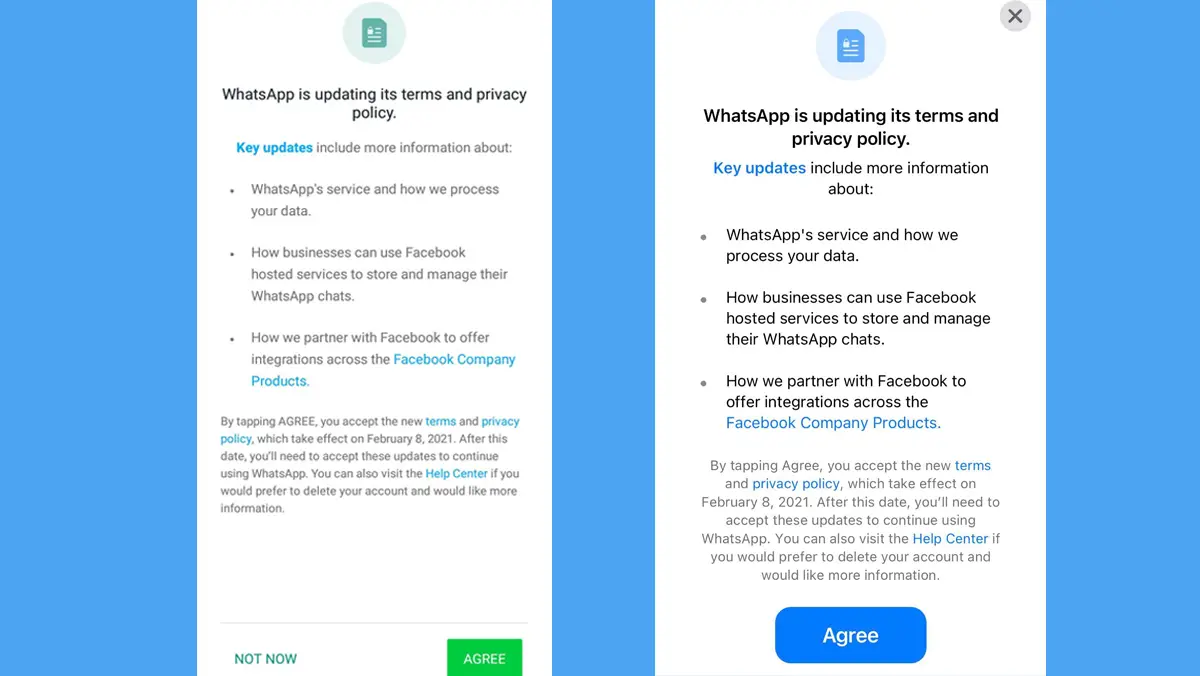 \
\Starting with a quote " when you're getting anything for free, then you're the product."
The updated privacy policy further highlights how other Facebook companies may use the information collected from WhatsApp. This includes:
- helping improve infrastructure and delivery systems;
- understanding how our Services or theirs are used;
- promoting safety, security, and integrity across the Facebook Company Products, e.g., security systems and fighting spam, threads, abuse, or infringement activities;
- improving their services and your experiences using them, such as making suggestions for you (for example, of friends or group connections, or of interesting content), personalized features and content, helping you complete purchases and transactions, and showing relevant offers and ads across the Facebook Company Products; and
- providing integrations that enable you to connect your WhatsApp experiences with other Facebook Company Products. For example, allowing you to connect your Facebook Pay account to pay for things on WhatsApp or enabling you to chat with your friends on other Facebook Company Products, such as Portal, by connecting your WhatsApp account.
Here is a breakdown of what the new WhatsApp privacy policy states, the data it collects, and how it interacts with other Facebook-owned companies:
1. What data does WhatsApp collect and when?
One of the many changes that the company provided information on is the data it collects from users, which includes account information, address book information, status information, transactions and payments data, customer support communications, and messages in some circumstances. According to the company, messages are only stored on your device and not on the company servers.
2. What kind of transactions, payments data does WhatsApp collect?
3. Does WhatsApp collect data on messages as well?
According to the company, the following scenarios describe circumstances where WhatsApp will store your messages:
Undelivered Messages: If a message cannot be delivered immediately (for example, if the recipient is offline), WhatsApp will keep it in encrypted form on its servers for up to 30 days and try to deliver it. If a message is still undelivered after 30 days, the message will be deleted.
Media Forwarding: When a user forwards media within a message, WhatsApp will store that media temporarily in encrypted form on our servers to aid efficient delivery of additional forwards.
Here is an image that shows data linked to you, used by some major messaging platforms.
 |
| Click the image to zoom. |
Do we need to stop using WhatsApp?
The short answer is no, nothing has really changed. WhatsApp's data sharing hasn't really changed, its security hasn't changed, it remains the largest end-to-end encrypted platform available, and one that's likely be used by all those you communicate with.
What will happen if didn't agree to WhatsApp's Privacy Policy?
What are the alternatives to WhatsApp?
1. Signal
Signal is a cross-platform encrypted messaging service developed by the Signal Foundation and Signal Messenger. It uses the Internet to send one-to-one and group messages, which can include files, voice notes, images and videos.
Download Links:
2. Telegram
Telegram is a freeware, cross-platform, cloud-based instant messaging, video calling, and VoIP service. It was initially launched for iOS on 14 August 2013 and Android in October 2013. The app servers of Telegram are distributed worldwide to decrease data load, while the operations center is currently based in Dubai.
Download Links:
3. Viber
Rakuten Viber, or simply Viber, is a cross-platform voice over IP and instant messaging software application operated by Japanese multinational company Rakuten, provided as freeware for the Android, iOS, Microsoft Windows, macOS and Linux platforms.
Download Links:







0 Comments: